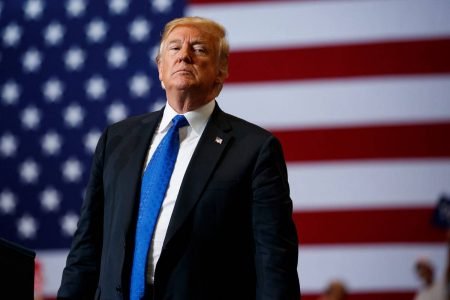
US President Trump prioritizes fight against Iranian-backed narcoterrorist network Obama neglected
The Trump administration is prioritizing the threat posed by Hezbollah and the rest of Iran’s terrorist proxy network in ways President Barack Obama’s administration never did, said the DEA’s top narcoterrorism agent.
John Fernandez, the assistant special agent in charge of the Special Operations Division’s Counter-Narcoterrorism Operations Center, told the Washington Examiner it was clear Trump had a stronger approach to combating and dismantling Iranian-backed terrorist operations, especially those of the Lebanese Hezbollah, and said that was good for the country’s safety.
“I think it’s safe to say that under the previous administration it was not prioritized as the threat that President Trump has prioritized it as,” said Fernandez, who has been with the agency for decades, including during the Obama administration. “And President Trump’s approach on it has been on a comprehensive scale, hitting it from every resource and every tool and every authority that the U.S. government has — not just military, not just intelligence community, but law enforcement as well.”
The DEA official pointed to ramped-up coordinated efforts from his agency as well as Customs and Border Protection and the Treasury Department and said he thought that, when comparing the Trump and Obama strategies, the “more robust approach has had a bigger effect and a bigger impact on the overall criminal network” and “a more positive effect for our national security.”
Fernandez made the comments during a discussion last week at the Washington Institute for Near East Policy in response to a question about allegations that the Obama administration had slowed or stalled the U.S. government’s effort to combat Hezbollah’s lucrative drug trafficking networks (dubbed “Project Cassandra”) during negotiations leading up to 2015’s Iran nuclear deal. The special agent had little doubt Trump’s approach was more serious than Obama’s, but he said, “It’s not a black and white issue like, ‘this administration totally screwed up and everything they did was wrong,’ and I think a lot of our good investigations were being conducted during the previous administration.”
Hezbollah was founded in the 1980s in Lebanon, but it now operates on six of seven continents on behalf of Iran, from whom it receives the vast amount of its funding, although money from Hezbollah’s criminal operations makes its way back to Iran’s coffers too. Hezbollah is responsible for a spate of terrorist attacks against the United States, including the 1983 Marine barracks bombing which killed 241 U.S. service members.
Qassem Soleimani, the commander of the Islamic Revolutionary Guard Corps and its Quds Force, guided many of Hezbollah’s operations. The Iranian general, who also oversaw efforts which took the lives of at least 603 U.S. military members in Iraq, was killed in a U.S. airstrike earlier this month.
“They killed more Americans than any other criminal organization before 9/11 — and possibly since 9/11,” Fernandez said of Hezbollah. “And they are a major proxy for Iran — part of its Iran threat network with its military wing deployed to Iraq, Syria, Yemen, and elsewhere.”
Fernandez said that, since 2017, the DEA’s efforts against Hezbollah’s criminal support network have resulted in an additional 17 indictments, 14 arrests, and three extraditions as well as nine Treasury Department terrorism designations.
“And on the immediate horizon, we have coming up, hopefully soon, four key pending arrests, eight pending indictments, four pending extraditions,” he said, in addition to further upcoming designations. Trump “wants everything in the U.S. government’s arsenal used against” the Iran threat network, making Hezbollah a unique target, he said, pointing to aspects of what the Trump administration calls its “maximum pressure” campaign against Iran, including U.S. support for Iran’s opponents in proxy wars throughout the region, increased sanctions against Iran following the U.S.’s withdrawal from the deal in 2018, a series of Hezbollah-linked Latin American drug cartel cases, the Justice Department’s designation of Hezbollah as a “priority” transnational criminal organization in 2018, the State Department’s designation of Iran’s revolutionary guard as a terrorist group in 2019, and Trump’s executive orders broadening the ability of the Treasury Department to sanction terrorists.
And the special agent said these increased efforts were showing results, though many cases were ongoing and classified. He did point to the arrest and extradition of Kassim Tajideen in 2017 and his sentencing last year, with the U.S. seizing over $50 million from the Hezbollah-linked operator of illicit businesses in Lebanon and Africa.
The DEA leader also highlighted the U.S.’s successes in convincing Paraguay, Argentina, and the United Kingdom to declare Hezbollah a terrorist organization in 2019, something Honduras said earlier in January it will also do.
“The DEA has never stopped pursuing Hezbollah’s criminal support network since they first identified it in 2007 with Operation Titan, and this is regardless of any of the foreign policies of any previous administrations,” he said.
And he highlighted significant anti-Hezbollah operations during the Obama administration, including a Lebanese-Canadian bank case involving a used cars and money laundering scheme in the U.S. and East Africa, the joint DEA-European Union “Operation Cedar” case exposing Hezbollah operatives using luxury goods and narcotics to launder money to buy weapons for the Syrian war, and the foiling of an Iran-Hezbollah plot to assassinate the Saudi ambassador in D.C.
Source: Washington Examiner





